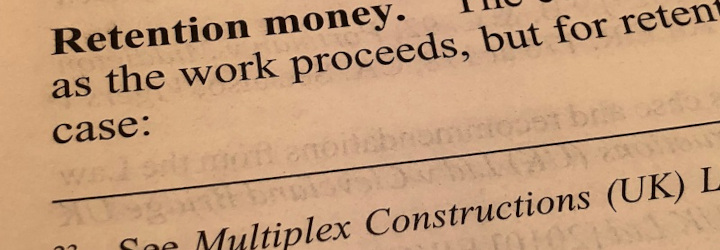30-08-2018
Continuing the topic of Construction Act Improvement, what if any changes should be adopted to improve the way in which Retention is dealt with?
Retention has been a cause of complaint and quarrel for all time in construction contracts.
It is designed to allow the Paying Party (e.g. the Employer or Contractor) a means to hold on to money due, just in case there is a dispute later. It is normally 3% - 5% taken from the gross value of the account as work proceeds and is in theory paid at the end of the project when everything is agreed and signed off. The intention historically is that the money belongs to the Payee and it is held in trust for them, but that is not how the law treats it by default.
The cynical view of Subcontractors is that there is nothing innocent about Retention and that it is nothing more than a device to take money from them never to be seen again, bolstering the Main Contractor's profit goal. It is also clear that in practice and in the absence of any guarantee, Retention has no special legal protection and is not ringfenced money as it ought to be and can be lost in the Payer's bankruptcy or in the cost of dispute. Take Carillion as the big example, the millions of pounds in Retention monies held belonging to all the Subcontractors was lost in the bankruptcy. Is this something we should all accept, or should there be more protection?
A proposed bill introduced to the House of Commons on 9th January 2018 to amend the Construction Act suggests the use of an approved Deposit Scheme, rather like Landlords now have to provide for their Tenants rent deposits. Where a retention clause is incorporated into a contract that clause would be ineffective unless the money is paid into the Deposit Scheme. The money would be ringfenced and protected from creditors and would not be released unless by agreement through negotiation or mediation or the decision of an adjudicator, ADR services that would be available under the Scheme.
The real question is can this be practical and commercial? Certainly, it aims to be fair particularly to the payee who has done the work. Commercially, the questions are:
- Would the cost of mediation or adjudication be cost prohibitive?
- If the sum is small, say £5,000 will the fees incurred using ADR be greater?
- Will an adjudicator be forced into assessing the whole Final Account to arrive at the sum due? (Final Account could include, say 1,000 disputed variations, delay analysis, loss and expense, contra charges, liquidated damages, repudiation, etc. etc. no small task)
- Given the above, would a capped fee scale for ADR services work?
- What about Party costs and interest in pursuit of the Retentions disputed in the Deposit Scheme?
- Can multiple contracts be amalgamated as a right for adjudication purposes? (Under current law each contract dispute must be adjudicated separately unless agreed and retentions are often small sums with the same Employer.)
What are your views on a Retention Deposit Scheme?


